
Top 5 Nonprofit CRM [Features, Pros & Cons, Selection Criteria]
 Updated on
Updated on
By Ringy
Table of Contents
Table of Contents
Supporters are signing on, donations are flying in, and three new organizations agreed to partner up and give to your cause.
Have you ever felt a more confusing combination of celebration and panic?
Yes, it's much-needed support - but how are you going to organize all this new data? Can you properly segment new donors from long-term ones? How do you avoid sinking into that sea of stress?
A nonprofit CRM can help you keep your head above water.
Sorting contacts, automating responses, segmenting mailing lists, and more can be achieved through a solid CRM. Plus, they allow you to monitor essential metrics so you can continuously improve your fundraising campaigns.
Sound like a lifesaver?
Well, we're here to save you.
What Is a CRM for Nonprofits?
A CRM for nonprofits is software that helps a nonprofit organization manage its contacts, donors, supporters, and business partnerships. It helps organize your supporter's data, spot donor trends, and collects valuable analytics on your processes.
"Wait," we hear you ask, "Doesn't CRM stand for "customer relationship management"?"
It might sound odd, but just as students act as the customer in your CRM for higher education, donors are a nonprofit's customers.
Though some folks think of it as a "constituent relationship management" system. ;)
And as a nonprofit gathers new constituents - non-donating supporters, donors, business partners - so grows a vast database. A vast database that you need to manage communicate with, and nurture on a nonprofit's strained time and resources.
All of that is less of a headache by organizing and segmenting your audience with nonprofit CRM software.
Organizing your donors and supporters is crucial when:
- 56% of all Americans donate to charity
- Overall giving grew 4.1% over the past year, but 40% of nonprofits reported a loss in revenue in 2020
What does this show? As we begin to emerge from the pandemic, nonprofits are hitting the ground running, collecting more supporters and donations to get back on their feet and flourish.
This means you've got quite a lot of donors to manage - and it'll be quite a handful without a nonprofit CRM.
We're not alone when we say that technology, specifically SaaS, is the future for nonprofits.
The 6 Desired Features of CRM Software for Nonprofits

Now that you're considering a nonprofit CRM, which features should you look for?
When it comes to CRM software, there are a lot of fish in the sea, all with a wide variety of features. So what are the must-haves for a nonprofit?
Top Features for Nonprofit CRM Software
|
Feature |
Description |
|
Sales and marketing automation |
Automate the little tasks so your team can focus on the big ones |
|
Detailed donor records |
Create accessible, in-depth contact records to improve productivity and keep everything tidy |
|
Analytics and reporting |
Manage and monitor crucial nonprofit reports to optimize your strategy |
|
Segmentation |
Segment your supporters to provide the best relevancy possible |
|
Mobile-responsiveness |
Access your data anywhere with a mobile-friendly CRM |
|
Auto-dialer functionality |
Save your team's valuable time by removing tedious phone tasks |
Now, for the nitty-gritty.
1. Sales and marketing automation
Your to-do list might look like this:
- Follow up with potential partner business
- Send out monthly donor status report
- Respond to and welcome new volunteers
When that's done, you might just have time to actually get charity work done.
Your time should be spent on your charity work - not inputting data and sending reminders.
Automation is a critical nonprofit CRM feature when you have so many constraints (like budget and time) and so few resources (like volunteers).
This loss of efficiency and time isn't only a blow to your productivity - it's a blow to your finances. You lose valuable time for key donation-driving activities when it's wasted on repetitive, tedious tasks like sorting contacts and sending out emails.
But setting up an automated drip campaign, for example, allows your email fundraising campaign to run itself as you're talking to high-priority donors and setting up crucial meetings.
2. Detailed donor records
Did you follow up with Donor A or Donor B?
When was the last time you made contact with Donor C?
One of the biggest challenges of running a large, successful nonprofit is juggling all the information - so detailed donor records are a must.
A solid CRM for nonprofits should have a detailed yet simple process for inputting, storing, and viewing contacts and donors.
Your time shouldn't be spent trying to find contact information - and that's if you even remember to look.
A nonprofit manager's life is hectic, and if supporter information isn't easy to find and isn't well-organized, it could easily slip through the cracks.
3. Analytics and reporting
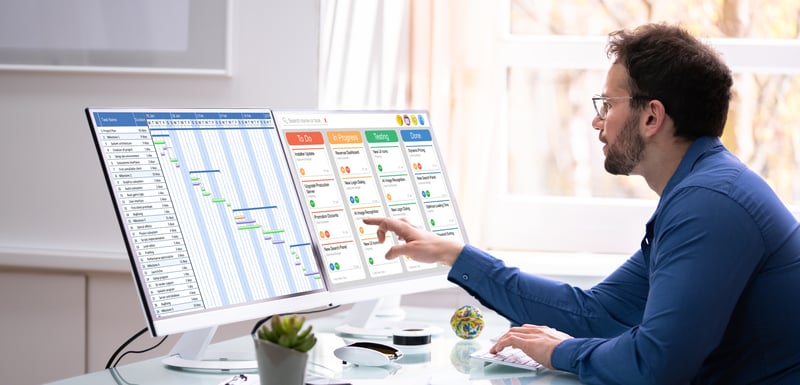
Knowing what works and what doesn't is key to success.
Sound obvious?
Okay, then let us ask you: Do you have a quick and easy way to assess what works and what doesn't?
It probably seems a little less simple now.
Nonprofits accumulate a lot of data, which requires a lot of reporting:
- Donation reports
- Donor reports
- Email fundraising reports
- Direct mail fundraising reports
- Event reports
- Report reports
Some nonprofit organizations may not even be able to gather all this data. CRM analytics enable your nonprofit to collect data surrounding donor lifecycle, email fundraising success, and other crucial insights to help improve the health of your organization.
Even if you have efficient ways to measure these key metrics, it's likely they're all over the place. Storing all your reports in a nonprofit CRM makes the job easier for everyone.
4. Segmentation
One size does not fit all when it comes to nonprofit supporters.
You can't send off one message to everyone and expect it to maintain value and relevance.
Your audience includes a diverse range of constituents like:
- New donors
- Recurring donors
- Past donors
- Businesses and organizations vs. individuals
These should all be their own segment and a nonprofit CRM that simplifies that will simplify your job, too.
New donors should be gradually welcomed in and nudged towards making a donation, but past donors should be thanked for their contributions and encouraged to continue supporting.
By aligning and targeting your campaign to boost relevance and overall value, you can make each move more impactful.
5. Mobile responsiveness
It's the age of convenience, and your team is likely on the go, which means mobile-friendly nonprofit CRMS are a must-have.
When your CRM is mobile-responsive, your workers can easily edit contact information in real-time - whether it's adding a brand-new contact or updating an old one.
This also puts donor information in your team's hands at all times, so they can access contact details on the fly.
You can learn the ins and outs of mobile CRM on our blog.
6. Auto-dialer functionality
Is telemarketing fundraising an important source of donations for your organization?
Utilizing a nonprofit CRM with auto-dialer functionality can make the process easier, faster, and more streamlined.
An auto-dialer helps cut out a few more of those tedious little tasks sucking away your team's time - like finding a contact to call and dialing the number.
It may sound small, but having software that handles those little details allows your team to bring up valuable contact information as the call connects itself, improving productivity and reducing just a little stress and burnout.
Auto-dialers can also log calls for quality control, provide a local ID to improve answer rates, send voicemails, and a whole lot more.
For an in-depth look, read our blog on great automatic dialer phone systems.
Nonprofit CRM Software Selection Criteria

Now that you have a handy list of features to look for, let's glance at the main criteria to consider when choosing the best CRM software for nonprofits:
- Costs
- Integrations
- Ease of use
- Scaling and size
Costs
Cost constraints are right in the name of a nonprofit organization, so it isn't surprising that cost is the most important consideration when choosing a nonprofit CRM.
Considerations surrounding budget, costs, and ROI are already top priorities for every business researching software, but a nonprofit has a much more limited budget than your average company.
When it comes to the price tag of your CRM, there are a lot of options:
- Expensive, enterprise CRM
- Low-cost CRM
- Free CRM
Talk to your team, review your own budget, consider the ROI, and then come up with a rough range of acceptable prices.
Whatever your budget, there's a CRM out there for you.
Integrations
You probably already have a host of tools you use to manage your activities, like Microsoft Excel for donation reports or Gmail or Outlook for fundraising emails.
So ask yourself: Does this nonprofit CRM easily integrate with tools I already possess?
A nonprofit's main aim is to spend time and resources wisely, and it doesn't do much for your productivity if you buy a shiny new tool and still have to spend ages transferring data.
Much of a company's data can be managed and shared across platforms as long as your CRM comes equipped with Zapier integration.
With Zapier integration, you can easily transfer contacts and leads from the source (like Facebook ads), or from your own logs.
Ease of use
Yes, it's a bit trite and obvious, but when it comes to CRM software, the learning curve and ease of use are even more critical to nonprofit organizations.
Volunteers and employees alike in a nonprofit may not have special training in sorting contacts or sending out drip campaigns. You're grateful to have their precious time - they may not be an expert in technology, but they're a hardworking, giving individual.
Choosing a CRM with a user-friendly interface and a smooth learning curve allows any worker you want (or need) to run it, regardless of their professional background.
Scaling and size
How big is your nonprofit organization?
Better question - how big does your nonprofit plan to get in the coming months and years?
Scaling is an essential CRM consideration for two main reasons:
- Many CRMs have specific packages based on the number of users
- The number of volunteers varies widely among nonprofit organizations
Nonprofits have a wide range of sizes, anywhere from 10-20 volunteers for smaller charities to a staggering 15,000 for Greenpeace.
This means an enterprise CRM like Salesforce would be well-suited for a large charity, while a small charity would want to look for something tailored for their size - otherwise, they would be drowning in features and costs that they never needed in the first place.
Pros and Cons of Free CRM Nonprofit Software
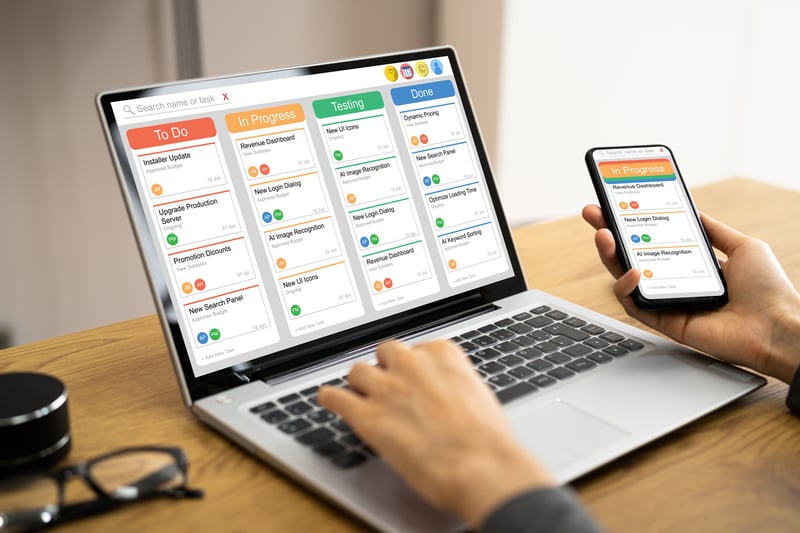
We admit it isn't all roses. When you consider the strain most nonprofits are under, the undertaking of a new piece of software adds somewhat of a thorn to that rose.
Although nonprofit CRM software organizes your supporters and optimizes your fundraising campaigns, it's hard to ignore that price tag when your budget is so limited.
So why not opt for a free one?
Let's take a look at the pros and cons of free CRM nonprofit software:
|
Pros |
Cons |
|
|
When you're just starting out and getting your feet wet, a free nonprofit CRM isn't a bad choice. You can give it a shot for a few weeks and see if it fits.
But for most companies they're going to find out quickly that a free CRM doesn't have the functionality they need.
The amount of time and effort you invest into implementation and onboarding is extensive - and then you have to throw it all out, find a new CRM, and start over?
It's a headache that most businesses avoid.
Our opinion? Look for a solid CRM that isn't free but still suits your budget.
It'll be worth it in the end.
5 Best CRMs for Nonprofits
Let's get you started on the right foot by giving you a handful of our top choices of the best CRMs for nonprofits.
Even with all these key features and considerations to look for, a quick search for "nonprofit CRM" still turns up about 28,000,000 results, so we really would feel bad leaving you without a few recommendations.
All the prices mentioned below are accurate as of September 2022.
1. Ringy
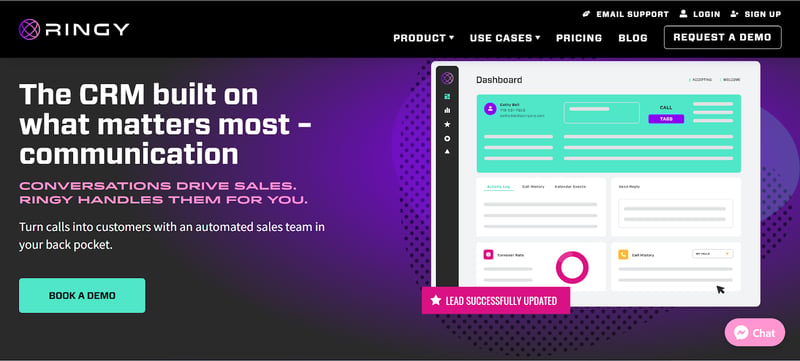
Yes, we know - of course, we're going to mention our very own Ringy. But we're confident about her, which are the cold hard facts.
Ringy is an all-in-one CRM focused on automation and actionable insights, so you can work smarter, not harder.
Ringy's top features include:
- Automation, including manual tasks and marketing campaigns
- Detailed, simple contact management
- Analytics and reporting
- Mobile-responsive
- VoIP softphone with auto-dialers and texting
Ringy has a strong focus on optimizing and automating tasks like sending emails, making calls, and creating to-do lists, so your team can get back to donation-driving activities that need a human touch.
Ringy's priced at $99/month and offers a 14-day free trial.
2. Blackbaud
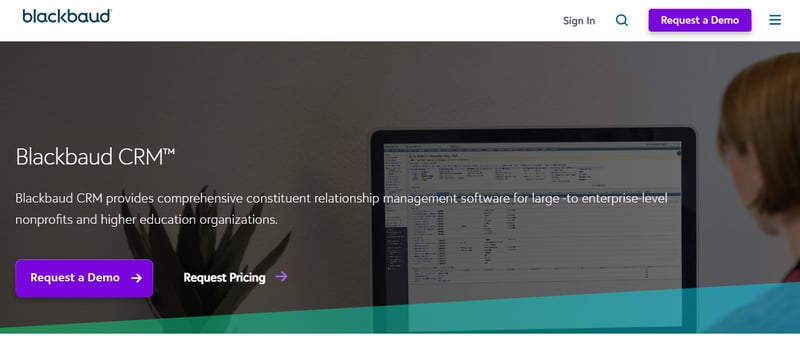
Blackbaud is CRM software designed for large nonprofits and higher education organizations.
They aim to help nonprofits grow stronger and increase donations through building solid donor relationships.
Here are a few of Blackbaud's features:
- Contact management
- Analytics
- Multichannel marketing
- Mobile responsiveness
- Integration with direct mail campaigns
Blackbaud is a solid choice for large nonprofits wanting to zero in on specific "nonprofit-only" features, like help with direct mail fundraising campaigns. It may be a bit too large and complex for smaller charities, though.
Contact Blackbaud for pricing information.
3. Bloomerang
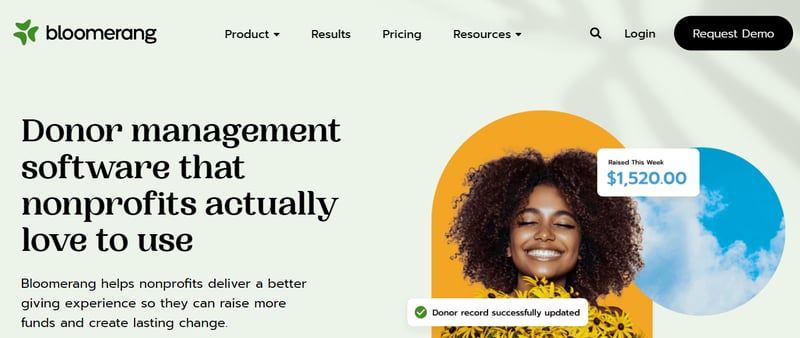
Bloomerang is a nonprofit CRM specifically designed for charities so they can build better donor relationships and manage their fundraising efficiently.
Bloomerang boasts features such as:
- Contact management
- Automation
- Real-time analytics
- Third-party integration
- Mobile-responsiveness
- Email marketing
Users praise its interface and ease of use, too. That makes Bloomerang a pretty solid nonprofit CRM.
Bloomerang's pricing is based on the number of records you intend to keep. The lowest tier starts with 1,000 records for $99/month and goes up to $599/month for over 50,000 records.
4. CiviCRM
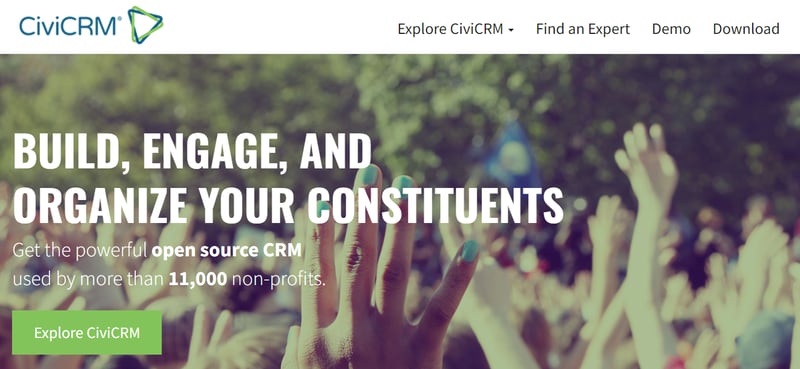
CiviCRM is open-source software, meaning the user can alter the coding and upgrade the system as they wish (as long as they have the tech know-how). Open-source also means that it's free.
CiviCRM specializes in:
- Case and contact management
- Email marketing
- Reporting
- Integration with WordPress, Drupal, Joomla, and Backdrop
Since it's open-source, CiviCRM allows you to customize your CRM to your needs, including adding custom fields and creating your own forms. Although, as we mentioned earlier, you do have to have the right technical knowledge.
CiviCRM is free.
5. Keela
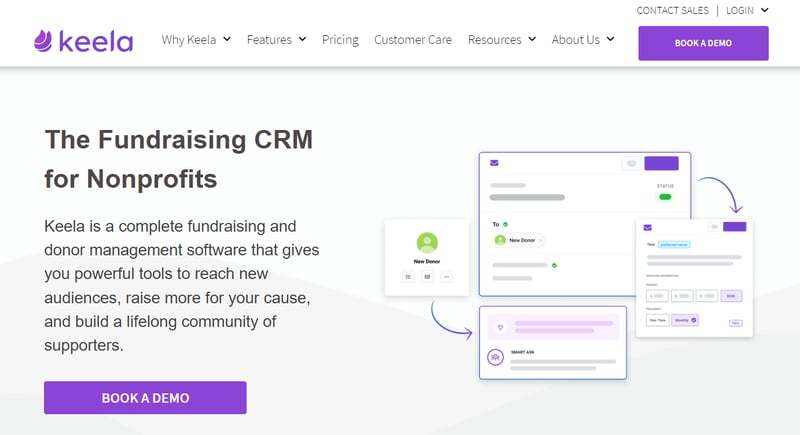
Keela is a nonprofit CRM with capabilities to streamline fundraising, manage your workers, and build a strong community of supporters and donors.
Here are Keela's top features:
- Contact management
- Email marketing
- Donor segmentation
- Analytics and reporting
- Automation
Keela also offers customizable donation forms to facilitate your fundraising efforts, so you can even run your donation pages from within your CRM.
Pricing starts at $150/month for 1,000 contacts.
Frequently Asked Questions About Nonprofit CRMs
"Does a nonprofit need a CRM?"
Yes, nonprofits, like any other business, benefit from the organization, automation, and connection that CRM software brings with it.
It might seem strange at first, but nonprofits are a business and have to be run like one to see lasting success. Nonprofit CRMs help your organization strengthen relationships and provide better opportunities.
"What CRM do nonprofits use?"
Nonprofits use a range of CRM software, from the large, complex Salesforce, to small, free CRM software. Like any company, a nonprofit's CRM depends on the organization's goals, budget, and a total number of contacts.
Your final choice ultimately rests on your organization's situation, but whatever it may be, there's a CRM suited to your needs.
"How much does a nonprofit CRM cost?"
A nonprofit CRM can range in price from free all the way to $600/month, depending on the software, its features, and the total number of users. The best CRMs for nonprofits tend to hover in the range of around $100/month, as they're decently affordable while still providing the value and security of a paid model as opposed to a free one.
Manage Your Supporters With The Help of a Nonprofit CRM

Don't let the "customer" in "customer relationship management" fool you - CRM software for nonprofits isn't only possible, it provides a wealth of amazing benefits.
Adopting a nonprofit CRM helps your team of hardworking volunteers focus on donation-driving activities by automating tasks, making contacts easy to pull up, and providing actionable insights via analytics and reporting.
If you're looking for great nonprofit CRM software, request a demo with Ringy and put our system to the test.
You might just end up spoiled with all the time you save.

Skyrocket your sales with the CRM that does it all.
Calling? Check. SMS? Check. Automation and AI? Check. Effortlessly keep in touch with your customers and boost your revenue without limits.

Take your sales to new heights with Ringy.
Sales in a slump? Ringy gives you the tools and flexibility you need to capture leads, engage with them, and turn them into customers.
Subscribe to Our Blog
Enter your email to get the latest updates sent straight to your inbox!
Categories
Related Articles




































































































